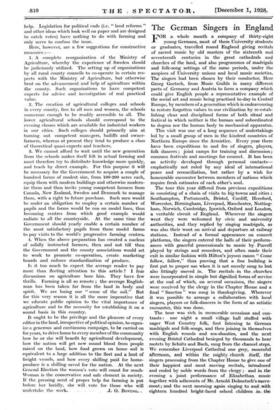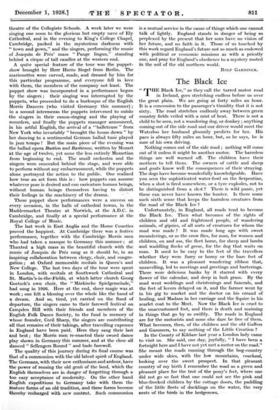The German Singers in England
FOR a_ whole month a company of thirty-eight young Germans, most of them University students or graduates,. travelled roped England giving recitals of sacred music by old- masters of the sixteenth and seventeenth centuries in the great cathedrals and churches of the land, and also programmes of madrigals and folk-song settings of the same periods, under the auspices of University unions and local music societies.
The singers had been chosen by their conductor, Herr _Georg Goetsch, from Music Guilds in many _different parts of Germany and Austria to form a company which could give English people a _representative. example of the social art and music being practised to-day in Central Europe, by members of a generation which is endeavouring to restore forgotten values to our civilization by re-estab- lishing clear .and.. disciplined forms of both ritual and festival .in which neither is .the. human soul subordinated to dogma nor the human body to mechanical apparatus. This visit was one. of a long sequence of. undertakings led by a small group of men in the kindred countries of _Northern Europe since the Armistice. Every year there have been. expeditions., to . and fro of singers,. players, folk dancers ; joint camps for training and discussion ; common festivals and meetings for counsel. It has been an activity . developed through personal contacts— emphatically not ruled by any ideal of international peace and reconciliation, but rather by a wish for honourable encounter between_ members of nations which require fresh estimates of each other's soul.
.The tour this year differed from previous . expeditions in consisting_ of a chain of visits to big towns and .cities Southampton, Portsmouth, Bristol, Cardiff, Hereford, Worcester, Birmingham, Liverpool, Manchester, Notting- ham, .Norwich, Cambridge, Ipswich, Oxford and London, a veritable circuit of England. Wherever the singers went they were welcomed by..civic and university Authorities, and they _ replied by singing madrigals, as was also their wont on arrival and departure -at railway stations. Instead ..of a formal appearance on concert platforms,. the singers entered the halls, of their perform- ances- with graceful -processionals to music by Purcell played by strings and recorders, and often . made their exit in similar fashion with Hilton's joyous canon "-Come follow, follow," -thus .proving that a fine building- is first put to proper use when it is not merely sung-to but also fittingly moved in. The recitals- !in the eh-grebes were incorporated in simple but- dignified forms of service at. the end - of which, on several occasions, _ the. singers .were received by the clergy in the Chapter House and a final "Sanctus " was sung in thanksgiving. Wherever it was possible to arrange a collaboration with local singers, players or folk-dancers in the form of an artistic encounter, this was done.
The tour was rich. in memorable occasions and coo- trasts one night a small village hall stuffed with eager West Country folk, first listening to German madrigals and folk-songs, and then-joining in themselves with English rounds -and sea-shanties, and the next evening Bristol Cathedral besieged by thousands to hear motets by Schutz and Bach, sung from the chancel steps. We -remember - Liverpool Cathedral one grey,- mournful afternoon, and within the mighty- church itielf, • _the singers processing from the Chapter House to give-one. of their happiest and . most moving -recitals,- introduced and ended- by noble words from the clergy ; - and in thee evening a joint performance of Elizabethan. music -together with adherents of Mr. Arnold- Dolmetsch's moye- -meat and -the next morning again singing to and . with eighteen hundred bright-faced school children in., the theatre of the Collegiate Schools. A week later we were singing one noon to the glorious but empty nave of Ely Cathedral, and in the evening to King's College Chapel, Cambridge; packed in the mysterious darkness with " town and gown," and the Singers, performing the music of Joaquin de Pres' mass " Pange lingua," standing behind a cirque of tall candles at the western end.
A quite special- feature of the tour was the puppet- show brought by Herr Marro Siegel 'from Berlin. The Marionettes were carved, made, and • dressed by him for this' particular programme, and everyone fell in lOve with them, the members of the company not least. The puppet show was incorporated in a performance begun by the singers ; their singing was interrupted by the puppets, who proceeded to do a burlesque of the-English Morris Dancers (who visited Germany this summer) ; in a second intermezzo the puppets intervened .to outdo the singers in their canon-singing and the playing of recorder's, and' finally the puppets manager announced, in his artful English, the arrival of a " balleteuse " from New York who invariably " brought the house down " by her dancing to a sentimental German ballad tune played in jazz tempo ! But the main piece of -the evening was the ballad opera Bastien and Bastienne; written by Mozart at the age of twelve, yet none the less entirely Moiartian from beginning to end. The small orchestra and the singers were concealed behind the stage, and were able to perform without any embarrassment, while the puppets alone portrayed the' action to the public. One realized how true an art form this is : how puppets can assume whatever pose is desired and can caricature human beings, without human beings themselves having to distort their 'feelings hi the machinery of the drama.
These puppet show performances were a success on every occasion, in the halls of cathedral towns, in the Maddermarket Theatre at Norwich, at the A.D.C. in Cambridge, and finally at a special performance at the Royal College of Music.
The last week in East Anglia and the Home Counties proved the happiest. At Cambridge there was a festive performance, together with the Cambridge Morris men who had taken a masque to Germany this summer ; at Thaxted a high mass in the beautiful church with the music of Joaquin de Pres sung as it should be, in an inspiring collaboration between' clergy, choir, and congre- gation ; -at Oxford memorable recitals in Queen's and New College. The last two days of the tour were spent in London, with recitals at Southwark Cathedral and St. Martin's-in-the-Fields, at which latter church Georg Goetsch's own choir, the " Markische Spielgemeinde," had sung in 1926. Here at the end, sheer magic was at work ; one felt a blessing over the whole like the hand of a dream. And so, tired, yet carried on the flood of departure, the singers came to their farewell festival on Campden Hill with their friends and members of the English Folk Dance Society, to the fund in memory of whose founder; Cecil Sharp; the singers- are contributing all that remains of their takings, after travelling expenses in England have been paid. Here they sang their last and best ; the Morris men re-enacted their sword dance play shown in Germany this summer, and at the close all danced " Sellengers Round " and bade farewell.
The quality of this journey during its final course was that of a communion with the old latent spirit of England. The Germans, with their new enthusiasm and ardour, have the 'power of rousing the old genii of the land, which the English themselves are in -danger of forgetting through a too easy acceptance 'of modernity. On the other hand English expeditions to' Germany take with them the feature forms of an old tradition,- and these forms become thereby recharged with new content. Such communion is a mutual service in the cause of things which one cannot talk of lightly. England stands in danger of being so perplexed by the present that her sons have no vision of her future, and no faith in it. Those of us touched by this work regard England's future not so much as endowed with political or economic missions as with a priestly one, and pray for England's obedience to a mystery rooted in the soil of the old northern world.
ROLF GARDINER.









































 Previous page
Previous page